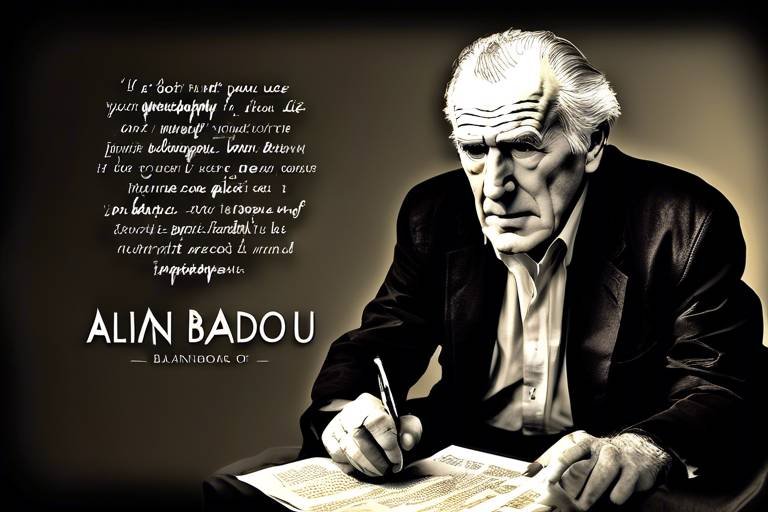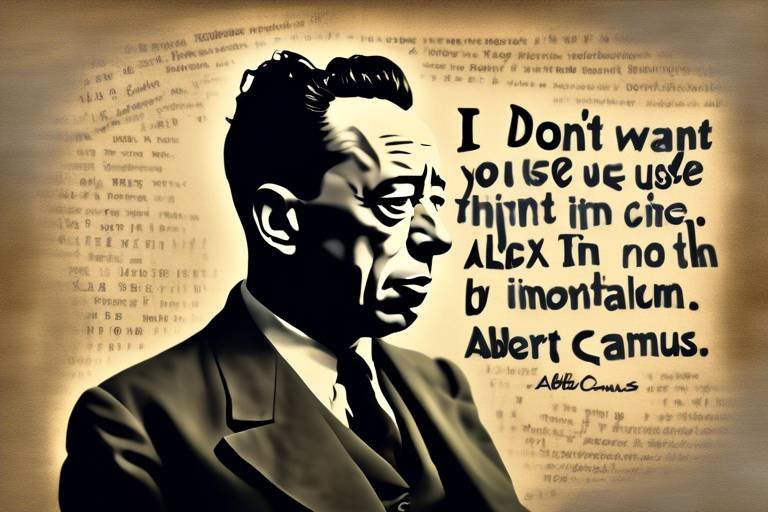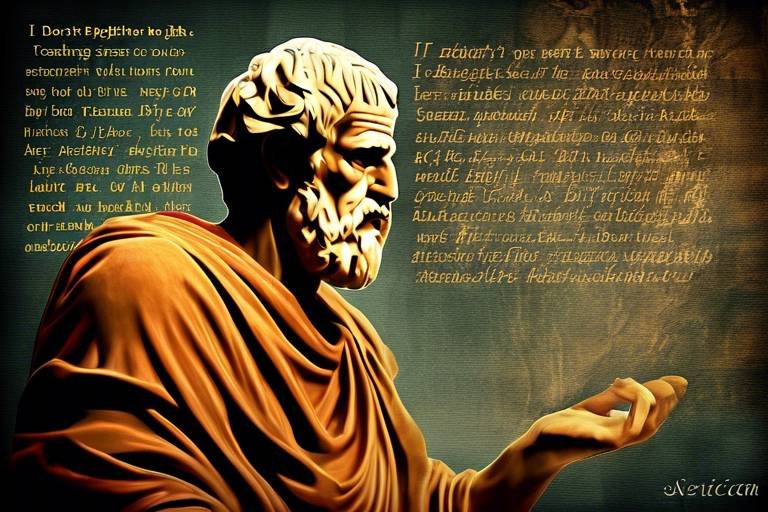Jean-Paul Sartre's Existentialism - What You Should Know?
Existentialism is a philosophical movement that has sparked countless debates and discussions, and at the forefront of this intriguing ideology is the renowned French philosopher Jean-Paul Sartre. His existentialism is not just a theory; it’s a vivid exploration of human existence, freedom, and the choices that define us. But what exactly does this mean? In the simplest terms, Sartre's existentialism posits that existence precedes essence, meaning that individuals are not born with a predetermined purpose or identity. Instead, we create our essence through our actions and choices. This radical idea challenges traditional views that suggest our lives are governed by a higher power or an inherent nature.
To truly grasp Sartre's existentialism, it's essential to understand its historical context. Emerging in the early 20th century, existentialism was a reaction to the disillusionment following World War I and the rise of nihilism. People were grappling with questions about meaning and purpose in a world that seemed increasingly chaotic and indifferent. Sartre, along with contemporaries like Simone de Beauvoir and Albert Camus, sought to address these existential crises by emphasizing the importance of personal freedom and responsibility.
What makes Sartre's existentialism particularly compelling is its focus on the individual. Unlike other philosophical movements that might prioritize collective values or universal truths, existentialism is deeply personal. It invites each person to confront their own existence and make choices that reflect their true selves. This perspective can be both liberating and daunting, as it places the onus of meaning squarely on our shoulders. In a world filled with uncertainties and complexities, how do we navigate our paths? Sartre encourages us to embrace the absurdity of life and find our own way, even when the answers seem elusive.
As we dive deeper into Sartre's ideas, we’ll explore his notions of freedom, bad faith, and the profound implications of his assertion that existence precedes essence. We’ll also see how these concepts have permeated literature, inspiring writers to delve into themes of alienation, absurdity, and the quest for meaning. Sartre’s existentialism is not just a philosophical doctrine; it’s a call to action, urging us to live authentically and take responsibility for our choices.
- What is existentialism? Existentialism is a philosophy that emphasizes individual existence, freedom, and choice, asserting that we create our own meaning in life.
- How does Sartre's existentialism differ from other philosophies? Sartre's existentialism focuses on personal freedom and the idea that existence precedes essence, contrasting with philosophies that suggest predetermined purposes.
- What is bad faith in Sartre's philosophy? Bad faith refers to self-deception and the denial of one's freedom, where individuals avoid taking responsibility for their actions.
- How has Sartre influenced literature? Sartre's ideas have inspired many authors to explore themes of absurdity, alienation, and the search for meaning, shaping the existentialist literary movement.

Understanding Existentialism
Existentialism is one of those philosophical movements that really grabs you by the collar and shakes you awake. It emphasizes the **individual's existence**, **freedom**, and the **choices** that come with being alive. Picture yourself standing at a crossroads, with countless paths stretching out before you. Each choice you make shapes not just your journey, but who you are as a person. That's the essence of existentialism! Unlike traditional philosophies that may assert a predetermined essence or purpose, Sartre flips the script by declaring that **existence precedes essence**. In simpler terms, you are not born with a defined purpose; rather, you create your own meaning through your actions and decisions.
Sartre's existentialism diverges from other philosophical movements such as **rationalism** or **empiricism**, which often rely on objective truths or universal principles. Instead, existentialism is deeply subjective. It challenges you to explore your own experiences and confront the absurdity of life. Imagine trying to find a needle in a haystack, but that needle is your purpose. Sartre argues that it’s up to you to sift through the chaos and find it. This perspective can be both liberating and daunting, as it places the responsibility of meaning squarely on your shoulders.
One of the most striking aspects of Sartre's existentialism is its focus on **authenticity**. He believed that being true to oneself is paramount. But what does that mean in a world that often pressures us to conform? Sartre encourages us to break free from societal expectations and embrace our individuality. This can be likened to a bird breaking free from its cage—once it takes flight, it discovers the vastness of the sky, much like how we can discover our true selves when we reject the confines of bad faith and societal norms.
To truly grasp existentialism, it's essential to understand its historical context. Emerging in the aftermath of World War II, it was a response to a world that seemed devoid of meaning. The horrors of war forced many thinkers to grapple with profound questions about existence, morality, and the human condition. Sartre and his contemporaries, like Simone de Beauvoir and Albert Camus, sought to make sense of a chaotic world where traditional values were crumbling.
In this philosophical landscape, existentialism became a beacon for those seeking to understand their place in a seemingly indifferent universe. It resonated with many who felt lost or alienated, providing a framework to explore their own existence. Sartre’s ideas not only influenced philosophy but also seeped into literature, art, and psychology, making existentialism a multifaceted movement that continues to impact us today.
In conclusion, understanding existentialism requires a willingness to confront uncomfortable truths about freedom, choice, and the search for meaning. It's about recognizing that life doesn't come with a manual; instead, it's up to each of us to write our own story. So, are you ready to embrace the challenge of crafting your own existence?

Sartre's Notion of Freedom
When we think about freedom, we often envision it as a blissful state where we can do whatever we want, whenever we want. However, for Jean-Paul Sartre, freedom is a double-edged sword. He believed that true freedom comes with a heavy weight—responsibility. Sartre's existentialism teaches us that we are not just free to make choices; we are also accountable for those choices and their consequences. This notion can be both liberating and frightening, as it places the onus of our existence squarely on our shoulders.
Imagine standing at a crossroads, with paths leading in every direction. Each choice you make not only shapes your future but also reflects who you are as a person. Sartre argues that we are condemned to be free, meaning we cannot escape our freedom or the responsibilities that come with it. This realization can lead to feelings of anxiety, as we grapple with the weight of our decisions and the impact they have on our lives and the lives of others.
One of the most intriguing aspects of Sartre's philosophy is how he articulates the paradox of freedom. While we have the ability to choose, our choices are often influenced by external factors—societal norms, cultural expectations, and personal circumstances. This interplay creates a complex web of freedom that is not as straightforward as it seems. Sartre challenges us to recognize that even in situations where we feel trapped, we still possess the freedom to choose our attitude and response.
To better understand Sartre's view on freedom, consider the following key points:
- Freedom and Responsibility: With freedom comes the duty to make choices that reflect our authentic selves.
- Freedom as Burden: The realization of our freedom can lead to existential angst as we confront the weight of our decisions.
- Choice in Confinement: Even in restrictive circumstances, we have the power to choose our perspective and response.
In Sartre's view, our freedom is not merely about making choices but also about embracing the consequences of those choices. This leads us to the concept of bad faith, where individuals deceive themselves to escape the anxiety of responsibility. By denying their freedom, they avoid facing the reality of their choices. Sartre urges us to confront our freedom head-on, as only then can we lead an authentic life.
Ultimately, Sartre's notion of freedom invites us to reflect on our existence. Are we truly living authentically, or are we hiding behind the comforting veil of societal expectations? By embracing our freedom and the responsibilities that accompany it, we can carve out a path that is uniquely our own, filled with meaning and authenticity.
- What does Sartre mean by "condemned to be free"? Sartre suggests that humans are inherently free to make choices, but this freedom comes with the burden of responsibility for those choices.
- How does freedom relate to authenticity in Sartre's philosophy? Authenticity involves recognizing and embracing one's freedom, making choices that reflect one's true self rather than conforming to societal pressures.
- Can we escape our freedom according to Sartre? No, Sartre believes that we cannot escape our freedom; we can only choose how to respond to it.

The Concept of Bad Faith
When we dive into the depths of Jean-Paul Sartre's existentialism, one of the most intriguing concepts that emerges is that of Bad Faith. But what exactly does this mean? At its core, bad faith refers to a form of self-deception where individuals deny their own freedom and responsibility. Imagine standing at a crossroads in life, faced with a choice that could change everything. Instead of embracing the uncertainty and taking ownership of your decision, you convince yourself that you have no choice at all. This is the essence of bad faith — a way of escaping the weight of existence.
Sartre argues that bad faith is a defense mechanism, a way to shield ourselves from the anxiety that comes with absolute freedom. We often find ourselves caught in a web of excuses, blaming external circumstances or societal pressures for our choices. For example, consider a person who remains in a stifling job. They might say, "I have to stay because I need the money," rather than acknowledging their fear of change or the discomfort of pursuing a passion. This denial not only robs them of their freedom but also leads to a lack of authenticity in their life.
To further understand bad faith, let's look at some common scenarios where it manifests:
- Staying in a toxic relationship because "it's easier than being alone."
- Ignoring a passion for art or music because "it's not a practical career choice."
- Conforming to societal expectations rather than pursuing personal dreams.
These examples highlight how bad faith can permeate our daily lives, often leading us to live inauthentic existences. Sartre believed that recognizing and confronting our bad faith is crucial for personal growth. It’s about peeling back the layers of excuses and facing the reality of our choices. By doing so, we can begin to reclaim our freedom and authenticity.
Moreover, Sartre's notion of bad faith isn't just an individual issue; it extends to our relationships with others. When we engage in bad faith, we not only deceive ourselves but also impact those around us. Consider a friendship where one person constantly makes excuses for not being there. This lack of honesty can lead to resentment and a breakdown of trust. Sartre emphasizes that to live authentically, we must be transparent in our relationships, acknowledging our freedom and the responsibilities that come with it.
In conclusion, the concept of bad faith serves as a powerful reminder of the importance of self-awareness and authenticity in our lives. By recognizing when we are living in bad faith, we can take steps towards embracing our freedom and living a fulfilling, genuine existence. After all, as Sartre famously said, "Man is condemned to be free." This freedom is both a gift and a burden, and it’s up to us to navigate it with courage and honesty.
- What is bad faith in existentialism? Bad faith is the act of self-deception where individuals deny their freedom and responsibility, often making excuses to avoid facing the truth of their choices.
- How can one overcome bad faith? Overcoming bad faith involves recognizing and confronting the excuses we make, embracing our freedom, and striving for authenticity in our lives and relationships.
- Why is recognizing bad faith important? Recognizing bad faith is crucial for personal growth and authenticity, allowing individuals to reclaim their freedom and make conscious choices that align with their true selves.

Examples of Bad Faith
When we think about bad faith, it often manifests in subtle yet profound ways in our daily lives. Sartre's notion of bad faith revolves around the idea of self-deception, where individuals often deny their freedom and responsibility, leading to a less authentic existence. Let’s explore some real-life examples that illustrate this concept:
Consider a person who remains in an unfulfilling job simply because they feel it's the only option available. They might tell themselves, "I need this job to survive," while deep down, they know they have the skills and capabilities to pursue something more fulfilling. This self-deception is a classic case of bad faith, where the individual avoids confronting their true desires and potential. Instead of taking action, they choose comfort over authenticity, shackling themselves to a life that doesn't resonate with their true self.
Another poignant example can be seen in relationships. Imagine someone who stays in a toxic relationship, convincing themselves that "it's better than being alone." Here, the individual is engaging in bad faith by denying their freedom to leave and the responsibility to seek a healthier, more fulfilling connection. They may rationalize their situation, but in doing so, they are neglecting their own agency and the possibility of a more genuine existence.
Bad faith can also be observed in societal contexts. For instance, when individuals conform to societal norms simply to fit in, they often suppress their true selves. This can manifest in various ways, such as:
- Choosing a career path based solely on parental expectations rather than personal passion.
- Adopting beliefs or values that are popular in their social circles, even if they contradict their own principles.
- Participating in activities that they find meaningless just to avoid social isolation.
In each of these scenarios, the common thread is the avoidance of personal responsibility and the refusal to embrace one's freedom. Sartre argues that this denial leads to a life that lacks authenticity and fulfillment. By engaging in bad faith, individuals become prisoners of their own choices, often leading to feelings of despair and alienation.
Overcoming bad faith requires a conscious effort to acknowledge and embrace one's freedom. It’s about recognizing that while the burden of responsibility can be daunting, it is also liberating. By facing our choices head-on and accepting the consequences, we can begin to live more authentically and meaningfully.

Overcoming Bad Faith
Overcoming bad faith is a journey that requires a deep commitment to embracing one's freedom and authenticity. Sartre believed that recognizing our own freedom is the first step towards living a more genuine life. It’s like peeling an onion; each layer of self-deception we remove brings us closer to the core of our true selves. But how do we embark on this transformative journey? Here are some strategies that can help:
- Self-Reflection: Take time to reflect on your choices and motivations. Ask yourself tough questions about why you make certain decisions. Are they truly your own, or are they influenced by societal expectations?
- Accept Responsibility: Acknowledge that you are responsible for your actions. This acceptance can be daunting, but it’s essential for breaking free from the shackles of bad faith. Remember, with freedom comes the weight of responsibility.
- Embrace Authenticity: Strive to live authentically by aligning your actions with your true beliefs and values. This might mean making difficult choices that go against the grain, but it’s necessary for genuine self-expression.
- Engage with Others: Foster honest relationships where vulnerability is encouraged. Discussing your thoughts and feelings with others can help clarify your understanding of yourself and your choices.
It’s important to note that overcoming bad faith is not a one-time event but a continuous process. Just as a gardener tends to their plants, we must nurture our self-awareness and authenticity. This requires ongoing effort and willingness to confront uncomfortable truths about ourselves. Sartre suggests that by actively choosing to live authentically, we can break free from the patterns of self-deception that often govern our lives.
Moreover, engaging in meaningful activities that resonate with our true selves can also aid in overcoming bad faith. When we immerse ourselves in passions and pursuits that reflect our genuine interests, we create a life filled with purpose and fulfillment. Think of it as a compass guiding you through the fog of existential uncertainty; when you follow your true north, the path becomes clearer.
Ultimately, the journey to overcoming bad faith is about embracing the freedom to choose and the responsibility that comes with it. It is a profound act of courage to confront the lies we tell ourselves and to step into the light of authenticity. By doing so, we not only enrich our own lives but also inspire others to embark on their own journeys of self-discovery.
- What is bad faith? Bad faith is the act of deceiving oneself to avoid the anxiety that comes with true freedom and responsibility.
- How can I identify bad faith in my life? Look for patterns where you might be conforming to societal expectations or avoiding difficult choices. Self-reflection is key.
- Is overcoming bad faith a one-time process? No, it is an ongoing journey that requires continuous self-awareness and commitment to authenticity.
- What role does responsibility play in overcoming bad faith? Accepting responsibility for your choices is essential to breaking free from self-deception and living authentically.

Existence Precedes Essence
One of the most revolutionary ideas that Jean-Paul Sartre introduced is the concept that . At first glance, this may sound like a philosophical tongue twister, but it carries profound implications for how we understand ourselves and our place in the world. Traditionally, many philosophical doctrines posited that essence—our nature, purpose, or defining characteristics—comes before our existence. In other words, we are born with a predetermined essence that dictates our purpose. Sartre, however, flipped this notion on its head, asserting that we first exist and only then create our essence through our actions and choices.
This idea is akin to an artist standing before a blank canvas. Initially, the canvas is just a piece of fabric; it has no inherent meaning or purpose. But as the artist begins to paint, each stroke adds depth and character, ultimately transforming the canvas into a meaningful work of art. Similarly, Sartre believed that we are like that blank canvas. We enter the world without a predetermined essence, and it is through our experiences, decisions, and actions that we define who we are. This perspective empowers individuals, making it clear that we are not merely products of our environment, society, or biology. Instead, we are the architects of our own identities.
By asserting that existence precedes essence, Sartre challenges the traditional views on human nature. He argues that we are not born with a specific role or purpose; rather, we have the freedom to create our own meaning in life. This radical freedom can be exhilarating, but it also brings with it a weighty responsibility. The choices we make, big or small, shape our essence and define our character. Thus, we cannot escape the burden of responsibility that comes with our freedom. It raises a critical question: if we are responsible for creating our essence, what does that mean for our actions and decisions?
Moreover, this concept encourages a sense of authenticity in our lives. When we recognize that we are not bound by an inherent essence, we are liberated to explore our desires and aspirations. We can pursue paths that resonate with our true selves rather than conforming to societal expectations or norms. This leads to a more genuine existence, where we embrace our unique journeys and the choices we make along the way. However, it also underscores the importance of self-reflection and awareness, as we must constantly evaluate our decisions and their alignment with our evolving essence.
In summary, Sartre's idea that existence precedes essence fundamentally shifts how we perceive ourselves and our responsibilities. It invites us to take ownership of our lives, encouraging us to engage authentically with the world around us. As we navigate through life, let us remember that we are, in essence, the sum of our choices, and every decision contributes to the masterpiece that is our identity.

Influence on Literature
Jean-Paul Sartre's existentialism has left an indelible mark on the world of literature, inspiring countless authors to delve into the depths of human experience. His ideas about freedom, choice, and the inherent absurdity of life have shaped narratives and characters in profound ways. Just as a painter uses colors to express emotions on canvas, writers have utilized Sartrean concepts to explore the complexities of existence. The existentialist lens brings forth themes that resonate deeply with readers, making literature not just a form of entertainment, but a mirror reflecting the human condition.
One of the most significant impacts of Sartre's philosophy on literature is the exploration of alienation. Characters in existentialist literature often find themselves detached from society, grappling with feelings of isolation and despair. This sense of estrangement is not merely a backdrop; it serves as a catalyst for character development and plot progression. For example, in Sartre's own play, No Exit, the characters are trapped in a room, symbolizing the inescapable nature of their own choices and the consequences that follow. This setting underscores the existential belief that we are often our own worst enemies, locked in a struggle against our own decisions.
Another theme that emerges prominently in existentialist literature is the search for meaning. In a world devoid of inherent purpose, characters embark on personal quests to define their own existence. This is vividly illustrated in the works of authors such as Albert Camus, whose novel The Stranger presents the protagonist, Meursault, as a man indifferent to societal norms and expectations, ultimately leading him to confront the absurdity of life. Through such narratives, readers are invited to ponder profound questions: What does it mean to live authentically? How do we create meaning in a seemingly indifferent universe?
Moreover, Sartre's influence extends beyond just themes; it has also shaped the narrative techniques employed by writers. The use of stream-of-consciousness, for instance, allows readers to experience the inner turmoil of characters in real-time, mirroring the existential struggle between freedom and responsibility. This technique can be seen in the works of Virginia Woolf and James Joyce, who, while not strictly existentialist, were influenced by the philosophical currents of their time, including Sartre’s ideas.
To illustrate the impact of Sartre's existentialism on literature, here’s a brief overview of some notable authors and their contributions:
| Author | Notable Work | Existential Themes |
|---|---|---|
| Albert Camus | The Stranger | Absurdity, Alienation |
| Simone de Beauvoir | The Ethics of Ambiguity | Freedom, Responsibility |
| Franz Kafka | The Metamorphosis | Isolation, Absurdity |
| Friedrich Nietzsche | Thus Spoke Zarathustra | Existence, Individualism |
In conclusion, the influence of Jean-Paul Sartre's existentialism on literature is profound and multifaceted. His ideas have not only shaped the themes and characters within literary works but have also inspired a generation of writers to grapple with the complexities of human existence. As readers engage with these texts, they are not just consuming stories; they are embarking on a journey of self-discovery, questioning their own beliefs and the nature of their reality. This interplay between literature and existential philosophy continues to resonate, ensuring that Sartre's legacy endures in the hearts and minds of both writers and readers alike.
- What is existentialism? Existentialism is a philosophical movement that emphasizes individual existence, freedom, and choice, often exploring themes of absurdity and alienation.
- How did Sartre influence literature? Sartre's ideas about freedom and the search for meaning inspired writers to explore complex human experiences, resulting in themes of alienation and absurdity in their works.
- What are some notable existentialist works? Key works include The Stranger by Albert Camus, No Exit by Sartre, and The Metamorphosis by Franz Kafka.
- Can existentialism be applied to modern literature? Absolutely! Many contemporary authors continue to explore existential themes, reflecting the ongoing relevance of Sartre's ideas in today's world.

Existentialist Themes in Literature
Existentialism has left an indelible mark on literature, shaping not only the themes authors choose to explore but also the way they approach storytelling itself. At its core, existentialist literature grapples with the complexities of human existence, often portraying characters who are caught in the throes of absurdity, alienation, and the relentless search for meaning. This genre invites readers to ponder profound questions about life, identity, and the human condition, making it both compelling and deeply relatable.
One of the most striking themes in existentialist literature is the notion of absurdity. This theme reflects the idea that life is inherently meaningless, and yet, we are driven to search for meaning regardless of this absurdity. Authors like Albert Camus, in works such as The Stranger, illustrate this struggle through characters who confront the absurdity of existence head-on. The protagonist, Meursault, embodies this existential crisis, navigating a world devoid of clear purpose while still grappling with societal expectations and moral dilemmas.
Another prevalent theme is alienation, which often manifests as a profound sense of disconnection from oneself, others, and the world at large. This theme resonates deeply within the works of Franz Kafka, whose characters often find themselves in surreal and oppressive situations that highlight their isolation. In The Metamorphosis, for instance, Gregor Samsa’s transformation into a monstrous insect serves as a powerful metaphor for alienation, illustrating how societal norms can strip away one’s humanity and connection to others.
Furthermore, existentialist literature frequently delves into the theme of freedom and choice. Sartre’s assertion that we are condemned to be free emphasizes the weight of our choices and the responsibility that comes with them. This theme is vividly explored in works like Jean-Paul Sartre’s own Nausea, where the protagonist, Antoine Roquentin, grapples with the burden of freedom and the existential angst that accompanies it. The characters in these narratives often face pivotal moments where they must confront their own agency, leading to profound realizations about their identities and the world around them.
Additionally, the theme of despair is prevalent in existentialist literature, as characters confront the futility of their existence and the inevitability of death. This theme serves as a catalyst for self-discovery and authenticity, prompting individuals to confront their fears and embrace their freedom. In the works of authors like Søren Kierkegaard and Fyodor Dostoevsky, despair becomes a pathway to understanding oneself and one's place in the universe.
To summarize, existentialist themes in literature are rich and multifaceted, offering readers a lens through which to explore the complexities of life. From absurdity and alienation to freedom and despair, these themes resonate deeply with our own experiences, prompting us to reflect on our existence and the choices we make. As you delve into existentialist literature, consider how these themes not only shape the narratives but also mirror the struggles and triumphs of the human experience.
- What is existentialism in literature? Existentialism in literature is a philosophical movement that emphasizes individual existence, freedom, and the search for meaning in an indifferent universe.
- Who are some key existentialist authors? Notable existentialist authors include Jean-Paul Sartre, Albert Camus, Franz Kafka, and Fyodor Dostoevsky.
- What themes are commonly found in existentialist literature? Common themes include absurdity, alienation, freedom, choice, and despair.
- How does existentialism influence character development? Existentialism influences character development by presenting individuals who confront their own freedom and the responsibilities that come with it, often leading to significant personal growth or crisis.

Notable Existentialist Authors
When we talk about existentialism, Jean-Paul Sartre undoubtedly stands at the forefront, but he is far from the only voice in this intriguing philosophical movement. A plethora of authors have explored existential themes, each adding their unique twist to the conversation about existence, freedom, and the human condition. Let's dive into some of the most notable existentialist authors whose works echo Sartre's ideas and have shaped the landscape of existential literature.
One of the most prominent figures is **Simone de Beauvoir**, a pioneering feminist thinker and existentialist philosopher. Her groundbreaking work, The Second Sex, examines the oppression of women through an existential lens, arguing that "one is not born, but rather becomes a woman." This assertion aligns with Sartre's idea that existence precedes essence, emphasizing the role of individual choice in defining one's identity.
Another key figure is **Albert Camus**, known for his exploration of the absurd and the human struggle for meaning. In works like The Stranger and The Myth of Sisyphus, Camus delves into the conflict between our desire for significance and the indifferent universe. His famous assertion that "the only serious philosophical question is whether to commit suicide" encapsulates the existential dilemma of finding purpose in a seemingly meaningless world.
Then we have **Franz Kafka**, whose surreal and often nightmarish narratives reflect existential angst and alienation. In stories like The Metamorphosis, Kafka explores themes of isolation and the absurdity of existence, illustrating how individuals grapple with their identity in a world that feels both hostile and incomprehensible.
Lastly, we can't forget **Fyodor Dostoevsky**, whose works predate the formal existentialist movement but profoundly influenced its development. Novels like Crime and Punishment and The Brothers Karamazov delve into the complexities of morality, freedom, and the human psyche, raising questions about faith, guilt, and redemption that resonate with existential thought.
These authors, among others, have not only contributed to the existentialist canon but have also sparked dialogues that continue to resonate in contemporary literature and philosophy. Their works invite readers to reflect on their own existence, confront their freedom, and navigate the often turbulent waters of human experience. As we explore these texts, we uncover the diverse ways existentialism can manifest in literature, offering a rich tapestry of insights into what it means to be human.
- What is existentialism? Existentialism is a philosophical movement that emphasizes individual existence, freedom, and choice, suggesting that individuals create their own meaning in an indifferent universe.
- Who are some key figures in existentialism? Notable existentialist authors include Jean-Paul Sartre, Simone de Beauvoir, Albert Camus, Franz Kafka, and Fyodor Dostoevsky.
- What does "existence precedes essence" mean? This phrase, coined by Sartre, asserts that individuals are not born with a predetermined purpose; instead, they create their own essence through actions and choices.
- How has existentialism influenced literature? Existentialism has inspired writers to explore themes of absurdity, alienation, and the search for meaning, reflected in various literary works that challenge traditional narratives.
Frequently Asked Questions
- What is existentialism?
Existentialism is a philosophical movement that emphasizes individual existence, freedom, and choice. It posits that individuals are responsible for creating their own meaning in life, rather than relying on predefined essences or societal norms.
- How does Sartre's existentialism differ from other philosophical movements?
Sartre's existentialism is unique in that it asserts "existence precedes essence," meaning that a person's identity and values are not predetermined but are shaped by their actions and choices. This contrasts with traditional philosophies that suggest a fixed human nature.
- What does Sartre mean by freedom?
Sartre believed that true freedom is intertwined with responsibility. This means that while we are free to make choices, we must also bear the consequences of those choices, which can create a paradox of freedom where individuals may feel overwhelmed by their own autonomy.
- What is 'bad faith' according to Sartre?
'Bad faith' is a concept introduced by Sartre to describe self-deception and the denial of one's freedom. It occurs when individuals avoid facing the truth about their choices and responsibilities, often leading to inauthentic living.
- Can you give examples of bad faith?
Sure! Common examples of bad faith include staying in an unfulfilling job because one believes they have no choice, or staying in a relationship out of fear of loneliness rather than genuine connection. These situations reflect a refusal to acknowledge personal freedom and responsibility.
- How can one overcome bad faith?
Overcoming bad faith involves recognizing and embracing one's freedom. This can be achieved by making conscious choices, reflecting on one's values, and taking responsibility for one's actions, ultimately leading to a more authentic existence.
- What does 'existence precedes essence' mean?
This foundational idea suggests that individuals are not born with a predetermined purpose or identity. Instead, they create their own essence through their choices and actions, highlighting the importance of personal agency in defining one's life.
- How has Sartre influenced literature?
Sartre's existentialism has had a profound impact on literature, inspiring writers to explore themes such as absurdity, alienation, and the quest for meaning. His ideas encouraged authors to delve into the complexities of human existence and the individual's struggle for authenticity.
- What are some common existentialist themes in literature?
Common themes include despair, the search for meaning, and the confrontation with freedom and responsibility. These themes often resonate with Sartre's philosophical concepts, illustrating the human condition and the challenges of existence.
- Who are notable authors influenced by Sartre?
Several authors have been influenced by Sartre's existentialism, including Albert Camus, Simone de Beauvoir, and Franz Kafka. Their works often reflect existentialist themes and contribute to the broader existentialist literary movement.



















